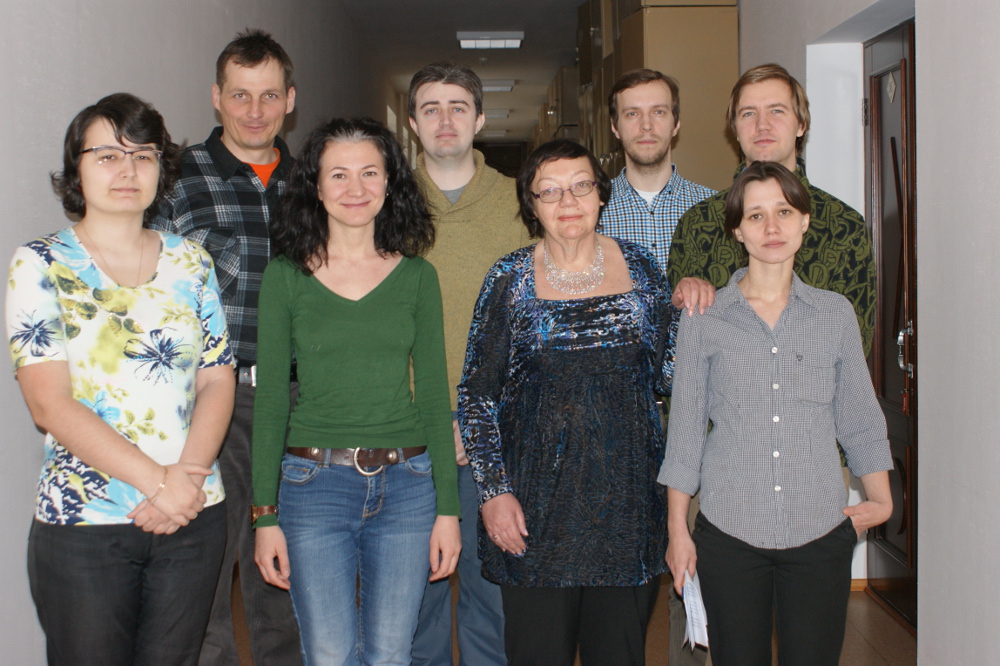Laboratory of community ethology

REZNIKOVA
Zhanna
Head of Laboratory
Lab Team

- Reznikova Zhanna, Head, Professor, DSc
- Panteleeva Sofia, PhD, senior researcher
- Druzyaka Alexey, PhD, researcher
- Iakovlev Ivan, PhD, researcher
- Levenets Jan, PhD, researcher
- Minina Maria, PhD, researcher
- Maslov Alexey
- Novikovskaya Anna, researcher
- Golovachev Alexey, PhD sutudent
The main areas of research
We are a group of researchers connected by the study of evolutionary, ecological, and cognitive aspects of animal behaviour and information theory as applied to these. We combine an evolutionary ecology perspective with the study of both cognitive and stereotyped mechanisms that underpin evolutionary adaptations. We consider model groups the species of solitary and social rodents, the species of ants with different levels of social organization, colonial gulls, and single nesting passerines. We firstly treat the variability of behavioral stereotypes as one of the essential properties of personalities in animals. In recent years, the study of personalities as a sustainable combination of individual behavioral characteristics, such as boldness, caution, aggressiveness, exploratory activity, in different contexts has become an accessible and relevant area of evolutionary ecology. Personalities are associated with crucial manifestations of fitness such as survival and reproductive success. The question of the possible individual variability of holistic behavioral stereotypes has not been studied until now. The variability of cognitive characteristics in populations and communities has been little examined before. We investigate obligate behavioral stereotypes that are subject to significant selection pressure and therefore are slightly variable and optional ones, as potentially the most variable. As obligate behavioral stereotypes, we consider the interaction with offspring in ants and colonial birds, as well as some standardized species-specific patterns in all species studied related to foraging, protecting the territory, etc. The study of optional stereotypes is based on the behavioral model that we successfully found: insect hunting in rodents with different types of diets. As one of the essential mechanisms of behavior variability, we consider the role of personality in population processes. We explore the cognitive tools of decision making as the final link of adaptive “tuning” of populations in a changing environment. Experimental studies are based on original concepts and hypotheses developed by our research group in recent years: the hypothesis of ambivalent foraging, the idea of cognitive specialization in populations and communities, the theory of distributed social learning. A mathematical analysis of animal behavior is based on the data compression method elaborated by our group and related to the ideas of Kolmogorov complexity. We pay special attention to the practical aspects of studying the stereotyped and flexible behavior of animals from insects to birds and mammals. This kind of quantitative information is a basic need in the assessment of the effect of human activities on organisms, and allows us to monitor the threats posed by global change threats to the conservation of animal populations.
Recent books
Zhanna Reznikova (2018). Chapter “ANTS” in: “Field and Laboratory Methods in Animal Cognition. A Comparative Guide”. Cambridge University Press.
Edited by Nereida Bueno-Guerra (Comillas Pontifical University) and Federica Amici (Universitat Leipzig).
Zhanna Reznikova (2017). Studying Animal Language Without Translation: An Insight From Ants. Springer International Publishing AG Switzerland.
Zhanna Reznikova (2016). Chapter “Insight” in: Encyclopedia of Evolutionary Psychological Science, Springer.
Selected publications
2019
Reznikova Zh., Levenets J., Panteleeva S., Novikovskaya A., Ryabko B., Feoktistova N.,. Gureeva A, Surov A. (2019). Using the Data-Compression Method for Studying Hunting Behavior in Small Mammals. Entropy. Vol. 21. 386. doi:10.3390/e21040368
Iakovlev I., Reznikova Zh. (2019). Red Wood Ants Display Natural Aversive Learning Differently Depending on Their Task Specialization. Frontiers in Psychology. Vol. 10. doi:10.3389/fpsyg.2019.00710
Reznikova Zh., Panteleeva S., Vorobyeva N. (2019). Precise relative-quantity judgement in the striped field mouse Apodemus agrarius Pallas. Animal Cognition. Vol. 22. P. 277–289. doi:10.1007/s10071-019-01244-7
2017
Reznikova Zh., Levenets J., Panteleeva S., Ryabko B. (2017). Studying hunting behaviour in the striped field mouse using data compression. Acta Ethologica. Vol. 20. P. 165–173. doi:10.1007/s10211-017-0260-9
Atsarkina N.V., Panteleeva S.N., Reznikova Zh.I. (2017). Myrmica rubra Ants Are More Communicative When Young: Do They Need Experience? Journal of Comparative Psychology. Vol. 131. P. 163–173. doi:10.1037/com0000067
Iakovlev I.K., Novgorodova T.A., Tiunov A.V., Reznikova Zh.I. (2017). Trophic position and seasonal changes in the diet of the red wood ant Formica aquilonia as indicated by stable isotope analysis. Ecological Entomology. Vol. 42. P. 263–272. doi:10.1111/een.12384
2016
Maksimova I.A., Glushakova A.M., Kachalkin A.V., Chernov I.Yu., Panteleeva S.N., Reznikova Zh.I. (2016). Yeast Communities of Formica aquilonia. Colonies Microbiology. Vol. 85. P. 124–129. doi:10.1134/S0026261716010045
2015
Ryabko D., Reznikova Zh. (2015). On the evolutionary origins of differences in sexual preferences.Front. Psychology. Vol. 6. 628. doi:10.3389/fpsyg.2015.00628
Reznikova, Zh I., A. A. Maslov, and S. N. Panteleeva. (2015). Experimental study of cognitive aspects of ambivalent foraging as exemplified by the great tit. Doklady Biological Sciences. Vol. 465. No. 1.
Reznikova, ZhI, and S. N. Panteleeva. (2015). Possible evolutionary mechanisms of'culture'in animals: The hypothesis of distributed social learning. Zhurnal obshchei biologii 76. 4, 295-309.
